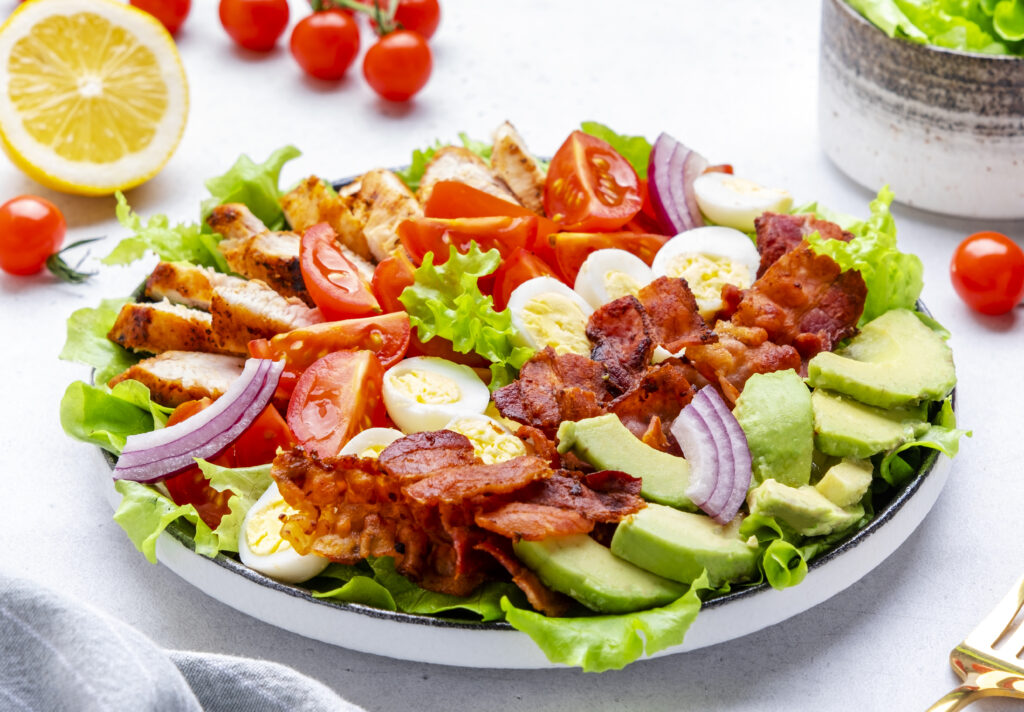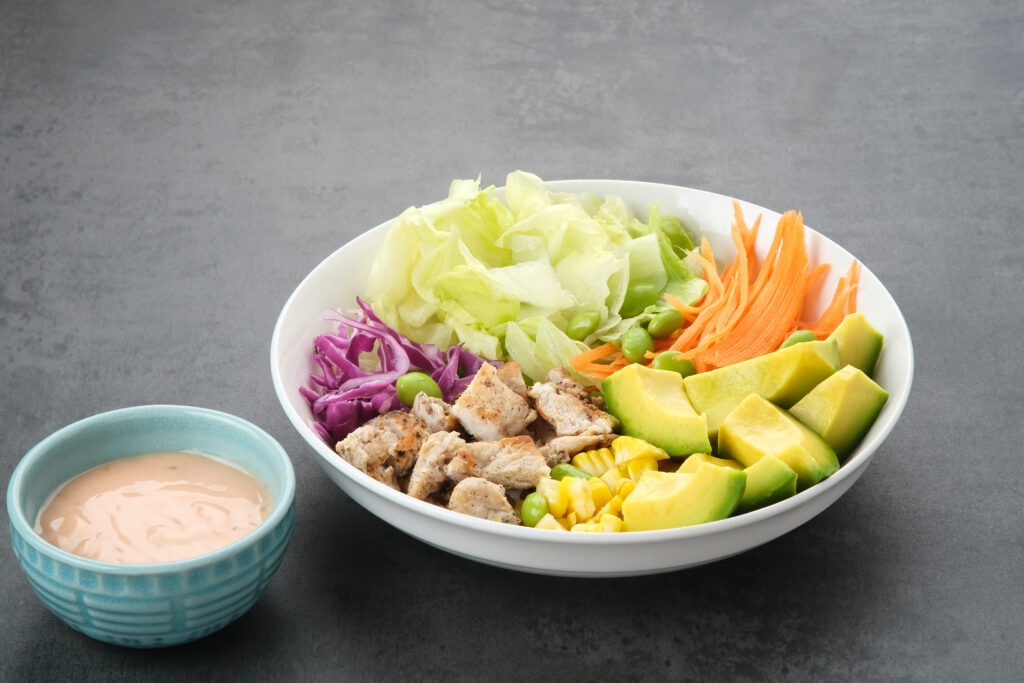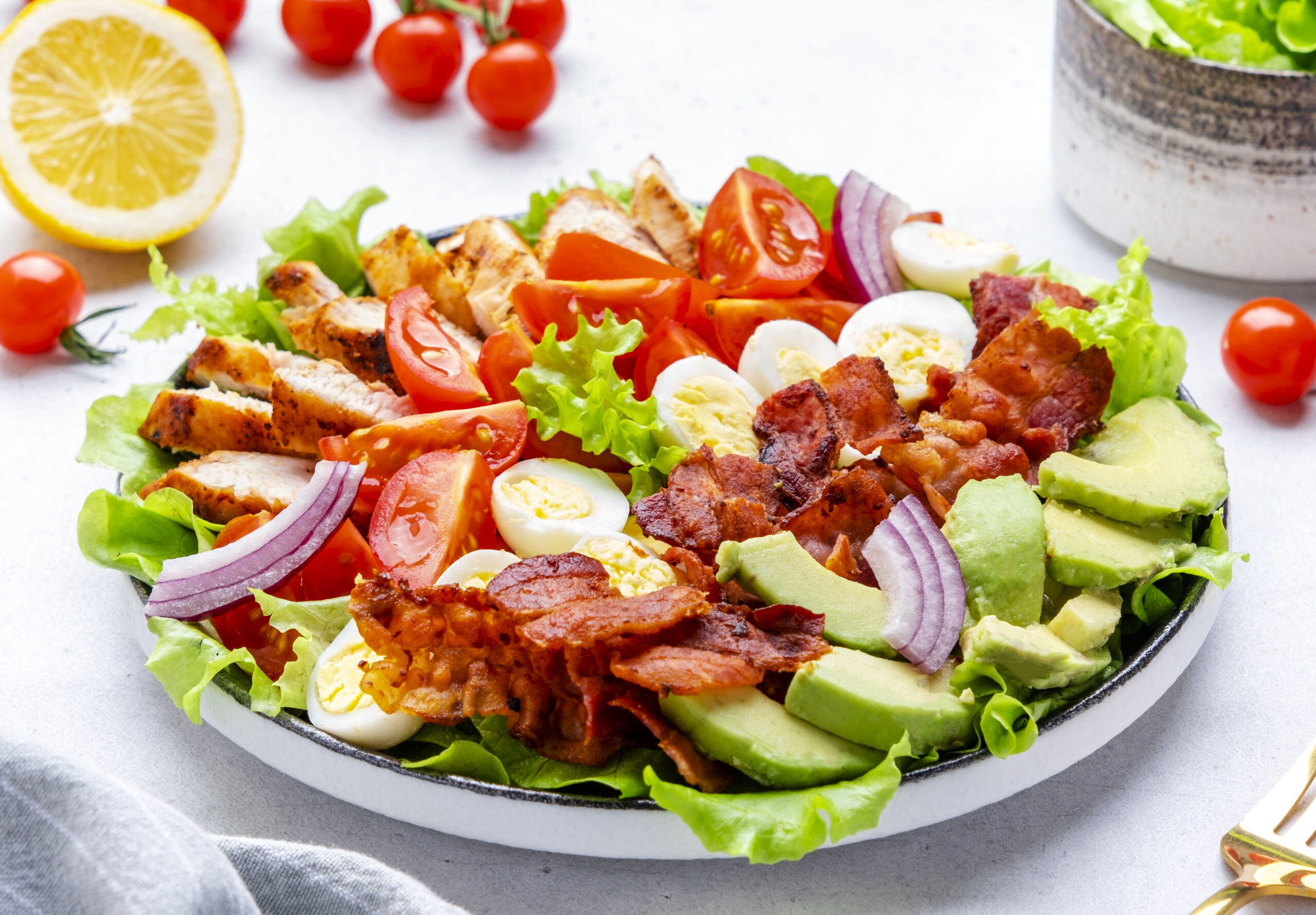Cobb salad is a protein-packed, flavorful dish enjoyed by many. It’s made with grilled chicken, eggs, bacon, avocado, cheese, and fresh veggies, making it a hearty option. But when it comes to carbohydrate content, is Cobb salad a good choice for low-carb diets?
In this Extensive guide, we will analyze the carb count, discuss whether Cobb salad is keto-friendly, compare it to other salads, and provide tips to make it even healthier. If you are following a low-carb, ketogenic, or balanced diet, this article will help you make informed choices.

What Is a Cobb Salad?
Cobb salad has been a classic American dish since the 1930s. It was first created at the Brown Derby restaurant in Hollywood, where it quickly gained popularity. Today, it remains a go-to option for those looking for a satisfying and nutritious meal.
Traditional Ingredients of a Cobb Salad
A classic Cobb salad consists of:
- Chopped greens – Romaine, iceberg, or mixed greens.
- Grilled chicken or turkey – A lean protein source.
- Hard-boiled eggs – Adds protein and healthy fats.
- Crispy bacon – Provides crunch and savory flavor.
- Avocado slices – A source of heart-healthy monounsaturated fats.
- Tomatoes – Adds freshness and vitamins.
- Crumbled blue cheese – Enhances flavor with tanginess.
- Dressing – Often a creamy blue cheese or ranch dressing.
This combination delivers a balance of protein, fats, and fiber, but what about carbs? Does Cobb salad fit into a low-carb or keto lifestyle?
For a deeper dive into Cobb salad nutrition, visit this complete guide.
How Many Carbs Are in a Cobb Salad?
Carb Breakdown of a Traditional Cobb Salad
Cobb salad is generally considered low in carbohydrates, but the total carb count depends on ingredients and portion sizes. Here’s an estimated breakdown:
| Ingredient | Total Carbs | Net Carbs (After Fiber) |
|---|---|---|
| Lettuce (1 cup) | 1g | 0.5g |
| Tomatoes (1/2 cup) | 3-4g | 3g |
| Avocado (1/2 medium) | 6g | 2g |
| Chicken (3 oz) | 0g | 0g |
| Egg (1 large) | 0.6g | 0.6g |
| Bacon (2 slices) | 0g | 0g |
| Blue cheese (1 oz) | 1g | 1g |
| Dressing (2 tbsp, ranch) | 2-5g | 2-5g |
Total Carb Estimate: 4-6g net carbs per serving
A homemade Cobb salad is naturally low in carbohydrates, making it a good choice for low-carb diets. However, restaurant versions may contain hidden carbs.
Restaurant Cobb Salad Carbohydrate Content
Many restaurant Cobb salads add ingredients that increase carb counts. Some common examples:
| Restaurant | Carbs per Serving |
|---|---|
| Chick-fil-A Cobb Salad | 31g total carbs |
| Panera Cobb Salad | 25-30g total carbs |
| Homemade Cobb Salad | 4-6g total carbs |
For a detailed breakdown of Cobb salad variations, visit this restaurant Cobb salad comparison.
Is Cobb Salad Keto-Friendly?
Yes! A traditional Cobb salad is keto-friendly when made with low-carb dressings and without high-carb toppings.
How to Keep Cobb Salad Keto
To make Cobb salad even more keto-friendly, consider these simple modifications:
- Skip croutons – Many restaurant Cobb salads contain croutons, adding unnecessary carbs.
- Use a low-carb dressing – Avoid store-bought dressings with added sugars.
- Increase healthy fats – Add extra avocado, olive oil, or full-fat cheese for more satiety.
- Limit tomatoes and onions – While nutritious, these can increase carb counts in strict keto diets.
For more keto-friendly Cobb salad tips, visit this guide.

Health Benefits of a Low-Carb Cobb Salad
A low-carb Cobb salad is not only nutritious but also provides many health benefits:
- High in Protein – Supports muscle growth, satiety, and metabolism.
- Rich in Healthy Fats – Avocado and olive oil contain monounsaturated fats, which support heart health.
- Low Glycemic Index – Minimizes blood sugar spikes, making it suitable for diabetics.
- Fiber-Rich – Helps with digestion and gut health.
If you’re interested in the sugar content of Cobb salad, read this article.
Potential Drawbacks of a Cobb Salad
While Cobb salad is generally healthy, it has some drawbacks:
- High in Calories – Cheese, bacon, and dressings can make it a calorie-dense meal.
- Sodium Content – Processed bacon and dressings lead to high sodium intake.
- Hidden Sugars – Store-bought dressings often contain hidden sugars.
For healthier Cobb salad alternatives, check out this low-calorie Cobb salad guide.
How to Make a Healthier Cobb Salad at Home
Creating a healthier version of Cobb salad is simple with these tips:
1. Choose the Right Greens
- Romaine lettuce
- Spinach
- Arugula
- Mixed greens
2. Select High-Quality Proteins
- Grilled chicken
- Turkey breast
- Hard-boiled eggs
3. Include Healthy Fats
- Avocado
- Olive oil-based dressing
- Full-fat cheese in moderation
4. Avoid High-Carb Additions
- No croutons or tortilla strips
- Skip sweetened dressings
Frequently Asked Questions (FAQs)
1. Is Cobb salad high in carbohydrates?
No, a homemade Cobb salad has low carbs (4-6g net carbs per serving). Restaurant versions may contain up to 30g of carbs.
2. Can I eat Cobb salad on a keto diet?
Yes! Cobb salad is keto-friendly if made with low-carb dressings and no croutons.
3. What dressing is best for a low-carb Cobb salad?
Choose olive oil and vinegar, keto ranch, or lemon-based dressings.
4. What are some high-carb ingredients to avoid in Cobb salad?
Avoid croutons, candied nuts, tortilla strips, and sweetened dressings.
5. How many carbs are in a restaurant Cobb salad?
Most restaurant Cobb salads have higher carbs due to extra toppings and dressings. Chick-fil-A’s Cobb salad has 31g total carbs.
Conclusion
Cobb salad is a low-carb, high-protein meal perfect for keto and low-carb diets. While homemade versions are nutrient-dense, restaurant options can be higher in carbs.
By using fresh ingredients, avoiding hidden sugars, and choosing the right dressings, you can enjoy Cobb salad guilt-free.

